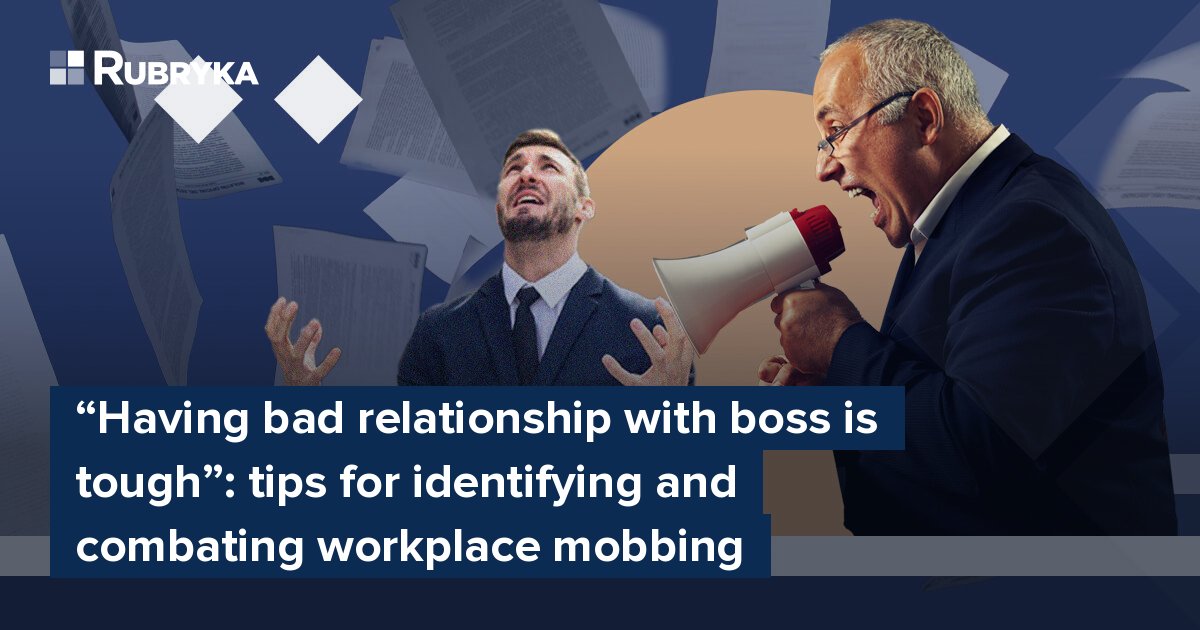
What is the problem?
There are various forms of workplace harassment, often referred to as mobbing, that can impact an individual in varying ways based on their level of resilience and emotional and psychological well-being.
Mobbing refers to a systematic and deliberate course of action (or inaction) by an employer or employees that vilifies and undermines an employee's dignity, causing harm to their reputation. Its essence is to exert pressure, often with the ulterior motive of coercing a colleague to resign or assume a different role. Inevitably, the team environment becomes hostile, leading the targeted individual to question their professional competence.
Yevheniia Loitra, aged 22, was subjected to workplace mobbing as a project assistant at a volunteer center dedicated to supporting mothers with children.
The girl remembers that the first month went smoothly. But then her workload increased significantly, and sometimes she didn't receive clear explanations about what she needed to do. Even the slightest mistake would trigger intense aggression from her manager, who didn't try to hide her emotional nature.
Even though the girl responded calmly to the manager's dissatisfaction, the boss became even more furious. She reasoned that Yevheniia acted like a pretentious, highly educated girl and should know how to stir up conflicts.

Illustrative picture: pixabay
"I heard her reply, "You never take responsibility for yourself. You refuse to take risks and always rely on my help." But when I attempted to do something alone, she would yell and insist that I consult her. It was like a never-ending cycle where I couldn't figure out the right way to handle the situation," Yevheniia says.
If the girl mentioned that there was a problem on the part of the manager, then she would shift the blame onto Yevheniia. They could sometimes communicate effectively, and there were three serious discussions about their working relations. After these conversations, work seemed to improve for a bit but ultimately returned to the usual pattern of hostile accusations, often baseless.
According to Valeriia Palii, the president of the National Psychological Association and a candidate in psychological sciences, mobbing can cause employees to feel depressed and is typically intended to harm and insult them. Everyone has varying levels of resilience: some can endure challenges for a prolonged period, while others may experience a psychological breakdown quickly. When a person becomes discouraged, they may develop depression, anxiety, and suicidal thoughts. This can ultimately affect their family life as their loved ones may not comprehend the underlying causes of their actions.
"According to statistics, in about a third of cases in different countries, mobbing originates from the management, not the team," Valeriia Palii says.
Various factors can contribute to mobbing, depending on the circumstances. According to Valeriia Palii, one possible explanation is that the perpetrators may not want to release the person openly, so they purposely create a hostile work environment to force them to resign. This tactic is often used in groups or organizations. It can result in negative consequences for the company, such as financial penalties, damage to their reputation, and potential legal action.
What is the solution?
If an employee is experiencing a change in their psychological and emotional well-being due to mobbing, it should serve as an alarm. Valeriia suggests that they reflect on the situation and consider possible reasons for it:
"If you feel that your emotional well-being has declined over a prolonged period, it may be connected to the workplace climate, both on a small and large scale. You need to think: what is happening? Why is this happening? Why have I found myself in this situation? What can be done with such a situation?"
Yevheniia began experiencing intense moral and psychological fatigue from her work as time passed. She remembers that even though she could keep her emotions in check and separate work from her personal life, her manager always managed to find some fault. The constant dissatisfaction and criticism left her feeling drained and burnt out by the midway point of her 3-month contract, as there were hardly any positive moments.

Illustrative picture: pixabay
"My parents began mentioning that I have changed. My friends also pointed out that I seemed less happy with my surroundings. It's tough to have a difficult relationship with your boss, especially when you rely on your job," Yevheniia shares.
Valeriia Palii stresses that each story and circumstance has its unique background and context, making the situations vary greatly. In such cases, it is crucial for an employee who has faced mobbing to seek support from others who can validate that there is indeed a problem at their workplace and that they are not at fault. It is valuable to have someone who can provide an external perspective and shed light on the true nature of the situation. Being immersed in the case can make it challenging to see all the subtleties.
"The ideal choice would be to work with an expert in the field, such as a psychologist or psychotherapist. They will carefully examine your unique situation and understand all the emotions you are experiencing. This is the most appropriate course of action. The specialist can guide you in responding to potential triggers and assist in making a thoughtful decision about continuing to work with the company," the psychologist suggests.
You should also ask yourself if it's time to consider dismissal. Is this truly the right job? Is it worth the struggle? Perhaps it would be beneficial to consider resigning and searching for a more positive work environment.
Why people don't quit their jobs after being bullied
The reasons can also vary – from instability and a narrow field of work to a lack of motivation to seek out new opportunities or even obligations outlined in contracts that prevent unilateral termination. Other factors, such as legal uncertainty and inadequate internal resources to combat difficulties and resist, can also contribute to a sense of "dependence on work."
"Our psychological background plays a significant role in this. For someone who had trouble standing up to authority figures, it might indicate a particular upbringing during their childhood that has impacted them. Some individuals have difficulty identifying and asserting their own needs. Others struggle with confrontations and find it challenging to address issues directly and clarify relationships," Valeriia explains.
Yevheniia had also considered leaving her job, but she put it off because she needed the money. However, after another conflict, she finally dared to make some significant changes.
"I held out until the end and didn't want to break the contract because it was my family's main source of income. I was working alone. In one of our usual conflicts, the manager wrote me peculiar things, including, "I don't understand, are you testing my patience to see how much longer I can handle your treatment of me?" Even though I never had such thoughts. Eventually, she expressed her desire to end our partnership, and I agreed."

Illustrative photo: pixabayThe argument carried on through the messenger, but after the manager suggested dismissing, the girl's eyes seemed to widen in realization:
"Why am I still clinging to this job and tolerating it? I need the income, but I can always seek a different job."
Yevheniia refused to succumb to the manager's manipulations about owning up to "her" mistakes. She simply stated that if the manager believed she was not performing adequately, it was best for her to resign. As tensions rose, the manager eventually backtracked and even suggested that she stay in her position.
Later, the girl mustered the courage to approach upper management and explain the situation while presenting the correspondence. The matter was promptly addressed, and Yevheniia was reassigned to a similar role at a different volunteer center according to the terms of her contract.
"Based on my experience, the most important advice is not to tolerate the situation. Instead, try to address the conflict directly or involve higher management for assistance. If that approach is unsuccessful, it may be time to search for new opportunities. From the organization's perspective, this can result in a loss, while for you, it can hurt your mental and physical well-being," Yevheniia says.
Valeria Palii shares the same viewpoint as the girl and notes that work occupies most of our time. Most of us have a 5-day work week and work from morning until evening.
"Work constitutes actually more than half of our life, without exaggeration. As a result, it is important to have a positive and productive atmosphere. It's impossible to always be happy due to various factors, but overall, the goal is to feel content at work. This will also positively impact our home life, leisure time, and personal growth."
What is the punishment for mobbing?
Mobbing is not allowed and is outlined in Art. 2-2 of the Ukrainian Labor Code. It encompasses distinct types of psychological and financial manipulation, which include:
- creating a tense and hostile environment for the employee through the use of threats, ridicule, slander, disparaging remarks, intimidation, and humiliating behavior, all meant to destabilize the employee's psychological well-being;
- unfairly isolating an employee from the team, such as excluding them from meetings and events they are required to attend according to local regulations and organizational protocols, hindering their ability to fulfill their job duties, or relocating them to unsuitable workspaces;
- unequal opportunities for education and career advancement;
- unequal compensation for employees with equal qualifications and work performance;
- unfair withholding of employee payments such as bonuses and other incentives;
- unjustified disproportionate amount of workload and tasks to employees with the same qualifications and level of productivity, even though they are performing work of equal value.
According to Yevhen Vorobyov, the lawyer for the NGO Human Rights Platform, the employer's requirements for the employee to fulfill their work duties correctly, move to a different workspace or role, or receive a different level of pay in accordance with legal procedures, a collective agreement, or an employment contract, are not classified as mobbing (harassment).

Illustrative pictures: pixabayIf an employee experiences workplace bullying, they can submit a complaint with evidence (such as documents, photos or videos, or witness statements) to the government organization responsible for enforcing labor laws (State Service of Ukraine on Labor Issues) and/or take legal action.
If someone is caught committing mobbing, the State Labor Service can file an official report against them under Article 173-5 of the Criminal Procedure Code. Based on the investigation findings, the court may impose a fine of 850-1,700 hryvnias or require the offender to complete community service for 20-30 hours. For individuals who have hired workers or for officials, the fine may be higher, between 1,700-3,400 hryvnias, or they may be required to perform public works for 30-40 hours.
Newsletter
Digest of the most interesting news: just about the main thing







